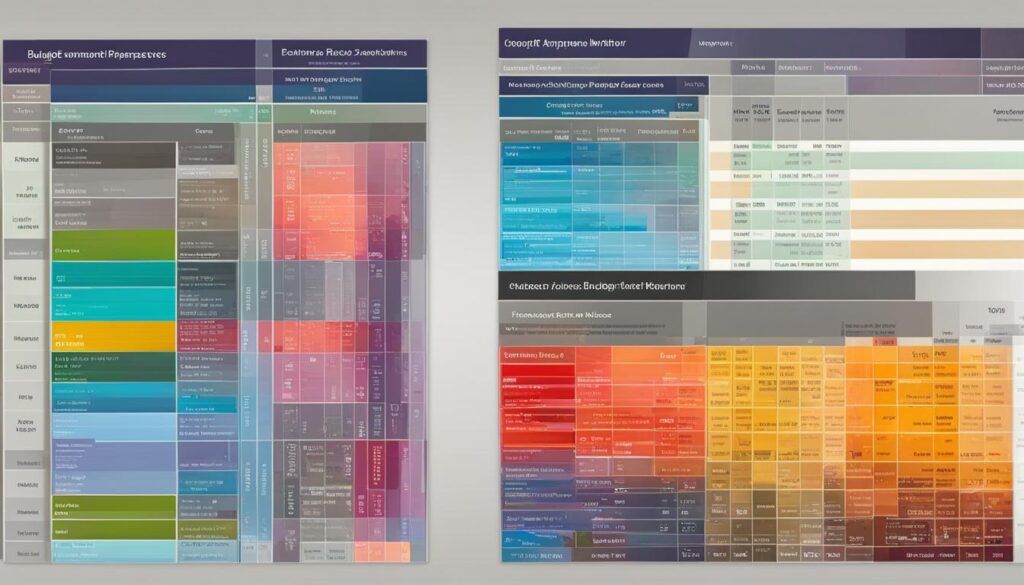If you’re a homeowner, your mortgage is likely your biggest monthly expense. But what happens if you suddenly find yourself unable to make the payments? Mortgage trouble can quickly spiral into financial turmoil, but there are steps you can take to avoid this situation.
In this section, we’ll provide you with valuable tips on how to avoid trouble when it comes to paying your mortgage. By following these tips, you can maintain financial stability in the ever-changing US market.
Key Takeaways:
- Creating a realistic budget is crucial to avoiding mortgage trouble.
- Having an emergency savings fund can protect you from unexpected expenses.
- Reach out to your lender for assistance if you anticipate trouble paying your mortgage.
- Research government programs that offer mortgage assistance.
- Prioritize your mortgage payments over other debt obligations to protect your credit score.
Understanding Your Mortgage
Before you can effectively manage your mortgage payments, it’s important to understand the terms of your loan agreement. This includes familiarizing yourself with mortgage terms and the specific details of your loan.
One important term to know is the interest rate, which determines how much you’ll pay in interest on your mortgage each month. Additionally, it’s essential to understand the length of your loan, or the number of years that you’ll be making mortgage payments.
Your loan agreement will also outline the consequences of missing a mortgage payment, including late fees and potential damage to your credit score. Understanding these details can help you avoid mortgage trouble down the line.
Take the time to review your loan agreement carefully and ask your lender any questions you may have. This will help you feel more confident in managing your mortgage and making informed financial decisions.
Common Mortgage Terms
| Term | Definition |
|---|---|
| Down payment | The initial payment made when purchasing a home, typically a percentage of the home’s price. |
| Principal | The amount of money borrowed to purchase the home. |
| Interest rate | The percentage of the loan amount charged as interest on an annual basis. |
| Amortization | The process of paying off a loan through a series of scheduled payments over a set period of time. |
| Escrow | A separate account for holding funds for items like property taxes and homeowners insurance. |
By understanding the terms of your mortgage and loan agreement, you’ll be better equipped to manage your monthly payments and avoid any potential financial difficulties in the future.
https://www.youtube.com/watch?v=5EbKbX9Ensw
Create a Realistic Budget
One of the most critical steps in avoiding trouble with your mortgage is to have a realistic budget. When budgeting for your mortgage, it’s essential to consider your monthly expenses, including groceries, utilities, and transportation costs.
Start by reviewing your bank statements and credit card bills to determine where your money is going each month. Look for areas where you can cut back, such as dining out or subscription services you don’t use.
Once you have a clear idea of your monthly expenses, you can calculate how much you can comfortably allocate to your mortgage payment. Remember that your mortgage payment should not exceed 28% of your gross monthly income.
Be sure to leave room in your budget for unexpected expenses, such as car repairs or medical bills. Having an emergency fund can help you avoid falling behind on your mortgage payments during difficult times.

Tip: Use a budgeting app or spreadsheet to track your spending and ensure you’re staying within your budget every month.
Save for Emergencies
Building emergency savings is crucial to protect yourself from unexpected expenses that could threaten your financial stability. Unexpected expenses are inevitable, whether it’s a sudden car repair or a medical emergency. Having a financial safety net can prevent you from falling behind on mortgage payments and help you manage other debt obligations.
Experts suggest keeping a minimum of three to six months’ worth of living expenses in your emergency fund. This means calculating all your monthly expenses, including your mortgage payment, and setting aside that amount in a separate savings account.
But how do you build an emergency fund when you already have a mortgage to pay? A great way is to make incremental changes to your budget. Look for areas where you can cut back on expenses and redirect those savings into your emergency fund. Even small changes, like reducing your cable bill or eating out less frequently, can add up over time.
| Unexpected Expenses to Consider | Cost |
|---|---|
| Car repair | $500-$1,000 or more |
| Medical emergency | $1,000-$5,000 or more |
| Home repairs | $1,000-$10,000 or more |
| Job loss | Varies |
Remember, having an emergency fund is not just about planing for unexpected expenses. It also provides peace of mind and financial security. You never know what life will throw your way, so it’s always better to be prepared.
There are also several online tools available that can help you automate your savings and track your progress. These tools can help you stay on track and make building your emergency fund a little easier.
While saving for emergencies may seem overwhelming, it can be done. It just requires patience, discipline, and a commitment to your financial well-being. Remember, having a financial safety net can help you avoid trouble paying your mortgage and keep you on track towards long-term financial stability.
Communicate with Your Lender
Don’t hesitate to communicate with your lender if you anticipate trouble paying your mortgage. By being proactive, you may be able to take advantage of mortgage assistance programs or hardship options that they offer. Your lender wants to help you avoid defaulting on your mortgage, so reach out to them as soon as possible.
Pro Tip: If you have experienced a financial hardship and are unable to make your mortgage payments, your lender may be able to offer you a forbearance plan. This plan allows you to pause or reduce your mortgage payments temporarily while you get back on your feet.
Make sure you have all the necessary documentation to share with your lender when you contact them. This may include proof of income, recent tax returns, and bank statements. Be honest and transparent about your financial situation so your lender can provide the best possible guidance.
If you are struggling with your mortgage payments, it’s important to act quickly and reach out to your lender. Ignoring the problem will only make things worse, so take advantage of the resources that are available to you.

Explore Refinancing Options
If you’re struggling to make your mortgage payments, consider exploring refinancing options. Refinancing involves replacing your current mortgage with a new loan that has more favorable terms, such as lower interest rates or reduced monthly payments.
Lower interest rates can significantly reduce your monthly mortgage payments, allowing you to save money and ease your financial burden. Reduced monthly payments mean you’ll have more cash available for other expenses, providing some breathing room in your budget.
| Refinancing Benefits | Refinancing Drawbacks |
|---|---|
|
|
Before making a decision, calculate the costs of refinancing and compare it to the potential savings. You can use online calculators or consult with a financial advisor to determine if refinancing is the right step for you.
Note: Keep in mind that refinancing may not be an option if your credit score has significantly declined since your initial mortgage application.
Consider Loan Modification
If you find yourself struggling to make your mortgage payments, it’s important to explore all your options, including loan modification. A loan modification involves adjusting the terms of your mortgage to make your monthly payments more affordable. This can be an effective solution if you are experiencing a significant change in your financial situation, such as a job loss or unexpected medical expenses.
Your lender may be able to adjust your mortgage terms in a variety of ways, such as:
| Adjustment Type | Description |
|---|---|
| Interest rate reduction | Your lender may lower your interest rate to reduce your mortgage payments. |
| Loan term extension | Your lender may extend the term of your loan, giving you more time to pay off your mortgage and lowering your monthly payments. |
| Principal reduction | Your lender may reduce the total amount you owe on your mortgage, which can lead to lower monthly payments. |
It’s important to note that loan modification is not a guaranteed solution and may not be the best option for everyone. However, if you are struggling to make your mortgage payments, exploring loan modification may be worth considering. Contact your lender to learn more about the loan modification process and whether it could help you achieve more affordable mortgage payments.
Seek Professional Help
If you find yourself struggling to make mortgage payments, seeking professional help is a crucial step. Professional mortgage assistance can come in many forms, including credit counseling and financial advisors.
Credit counseling agencies can provide you with personalized assistance to manage your debt and create a realistic budget. They can also help you understand your credit score and how to improve it, which is crucial when seeking mortgage financing.
Financial advisors can provide guidance on how to invest your money, reduce expenses, and improve your financial situation. They can help you create a long-term financial plan that ensures stability and security, including a plan to pay off your mortgage debt.
When seeking professional help, it’s essential to choose a reputable and trustworthy provider. Research potential providers, read reviews, and ask for recommendations from friends or family members who have used their services.
“Remember, seeking professional help is a sign of strength, not weakness. Don’t be afraid to ask for help when you need it.”
Research Government Programs
If you’re struggling with mortgage payments, there are several government programs that offer assistance.
- FHA Loans: The Federal Housing Administration offers loans with lower down payments and more relaxed credit score requirements. These loans can be a good option for first-time homebuyers or those with less-than-perfect credit.
- VA Loans: If you’re a veteran or active-duty service member, you may qualify for a VA loan. These loans often have lower interest rates and more flexible credit score requirements.
Research these programs to determine if you’re eligible and how they can assist you with your mortgage payments. Keep in mind that applying for these programs can be a lengthy process, so it’s best to start early.
Prioritize Your Mortgage Payments
It may be tempting to allocate your funds to other debt obligations, such as credit card debt or car payments, but it’s crucial to prioritize your mortgage payments. Falling behind on mortgage payments can negatively impact your credit score, making it difficult to secure future loans or favorable interest rates.
When faced with multiple debt obligations, consider creating a budget that allows you to make minimum payments towards other debts while prioritizing your mortgage payments. This may require making sacrifices, such as cutting back on non-essential expenses or seeking additional sources of income.
It’s important to note that prioritizing your mortgage payments does not mean ignoring other debts entirely. However, by making timely mortgage payments, you can ensure that your home remains a stable and secure asset, while actively working towards paying off other debts.
Stay Informed about Housing Market Trends
To avoid mortgage trouble and maintain financial stability, it’s essential to stay informed about housing market trends. Knowledge of the latest interest rate changes and refinancing opportunities can benefit you in many ways. By keeping an eye on market trends, you can make informed decisions regarding your mortgage and financial situation.
One way to stay updated on housing market trends is by regularly reading news articles and industry publications. You can also speak with financial advisors or mortgage professionals for their insights and recommendations.
Monitoring housing market trends can help you identify refinancing opportunities that can potentially lower your interest rates or reduce your monthly mortgage payments. Taking advantage of these opportunities can provide some much-needed relief to your budget while maintaining your financial stability.
Remember to stay proactive in your approach to managing your mortgage. With the knowledge gained from staying informed about housing market trends, you can make informed decisions and keep your mortgage payments manageable.
Conclusion
By following these mortgage tips, you can avoid financial instability and maintain a strong financial footing. Remember to stay proactive and take necessary steps to protect yourself from unexpected expenses. It’s important to create a realistic budget and prioritize your mortgage payments over other debt obligations to avoid negatively affecting your credit score.
If you find yourself struggling with mortgage payments, don’t hesitate to communicate with your lender and explore options such as refinancing or loan modification. Seeking professional help from credit counseling agencies or financial advisors can also provide tailored guidance to improve your situation.
Keep yourself informed on housing market trends to take advantage of potential refinancing opportunities or interest rate changes that can positively impact your mortgage situation. By implementing these strategies, you can achieve financial stability and avoid trouble paying your mortgage in the US market.
FAQ
How can I avoid trouble paying my mortgage?
To avoid trouble paying your mortgage, you can follow these tips and strategies:
Why is it important to understand my mortgage?
Understanding your mortgage, including mortgage terms and loan agreement details, is crucial for better navigating your financial obligations.
How can I create a realistic budget for my mortgage?
To create a realistic budget for your mortgage, take into account your monthly expenses, including your mortgage payment, and ensure that your income can comfortably cover these costs.
Why is it important to save for emergencies?
Building an emergency savings fund is essential to protect yourself from unexpected expenses and to avoid falling behind on mortgage payments during challenging times.
What should I do if I anticipate trouble paying my mortgage?
If you anticipate trouble paying your mortgage, reach out to your lender. They may have mortgage assistance programs or hardship options available to help you navigate difficult financial situations.
How can refinancing help me with my mortgage?
Refinancing can potentially lower your interest rates or reduce your monthly mortgage payments, providing some breathing room in your budget.
What is loan modification and how can it benefit me?
Loan modification involves adjusting your mortgage terms to make your monthly payments more affordable, which can be beneficial if your financial situation has significantly changed.
Should I seek professional help with my mortgage?
If you’re struggling with mortgage payments, consider seeking professional help from credit counseling agencies or financial advisors. They can provide guidance tailored to your specific situation.
Are there any government programs that can help with my mortgage?
Research government programs that offer mortgage assistance, such as FHA loans or VA loans, as they are designed to support homeowners in challenging financial circumstances.
Why is it important to prioritize my mortgage payments?
Prioritizing your mortgage payments over other debt obligations is crucial to avoid negatively impacting your credit score and overall financial health.
How can staying informed about housing market trends benefit me?
Staying informed about housing market trends, including changes in interest rates or refinancing opportunities, allows you to make timely decisions that can positively impact your mortgage situation.
What can I achieve by applying these tips and strategies?
By applying these tips and strategies, you can avoid trouble when it comes to paying your mortgage and maintain financial stability in the ever-changing US market.
